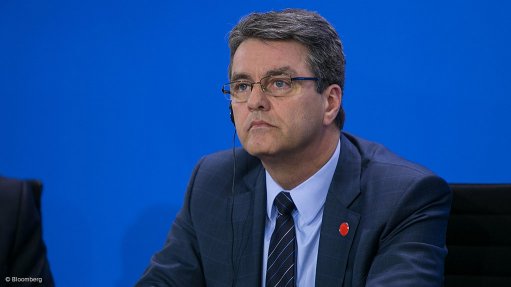
WTO director general Roberto Azevedo
Photo by: Bloomberg
World trade has not recovered from the global economic recession in 2008 and countries are hesitant to open their markets, Roberto Azevedo, director general of the World Trade Organisation (WTO), said on Thursday.
Azevedo and Trade and Industry Minister Dr Rob Davies spoke at a media briefing at Parliament to discuss the Doha Development Agenda and outcomes of the WTO’s 10th ministerial conference which was held in Nairobi, Kenya in mid-December last year.
“Globally speaking, trade openness is not very favourable,” Azevado said, “and we expect protectionism to continue, although we’ve started to monitor trade restrictive measures in our member countries.”
The 2030 Agenda for Sustainable Development, which was adopted in 2015 to guide global trade development priorities over the next 15 years, has made strides in establishing a multilateral trading system. However, there are still shortcomings that need to be addressed.
“We’ve had big discussions about how to continue negotiations. One of the key issues is about agricultural goods and services and protectionism,” Azevado said.
Davies also weighed in, saying that the WTO is in a period of reflection on how to move forward. “In the multilateral system South Africa will have a voice which will be heard, but that doesn’t mean imbalances in world trade is something of the past just because there’s a multilateral system in place,” Davies said.
"Things such as subsidies and high tariffs in various markets distort trade to the disadvantage of the developing world in general.
“The process that unfolded after the Doha Round reproduced imbalances and South Africa was placed in a very vulnerable position, because our apartheid leaders regarded South Africa as a developed country,” said Davies.
He also pointed out that matters such as anti-dumping duties and localisation should not be regarded as protectionism. “Many countries have higher levels of localisation than we do, and we’re entitled to take decisions to advance our developmental needs."
He referred to the collapse in commodity prices, which is having an adverse effect on South Africa and the rest of the continent. “Therefore we need to industrialise through regional trade agreements.”